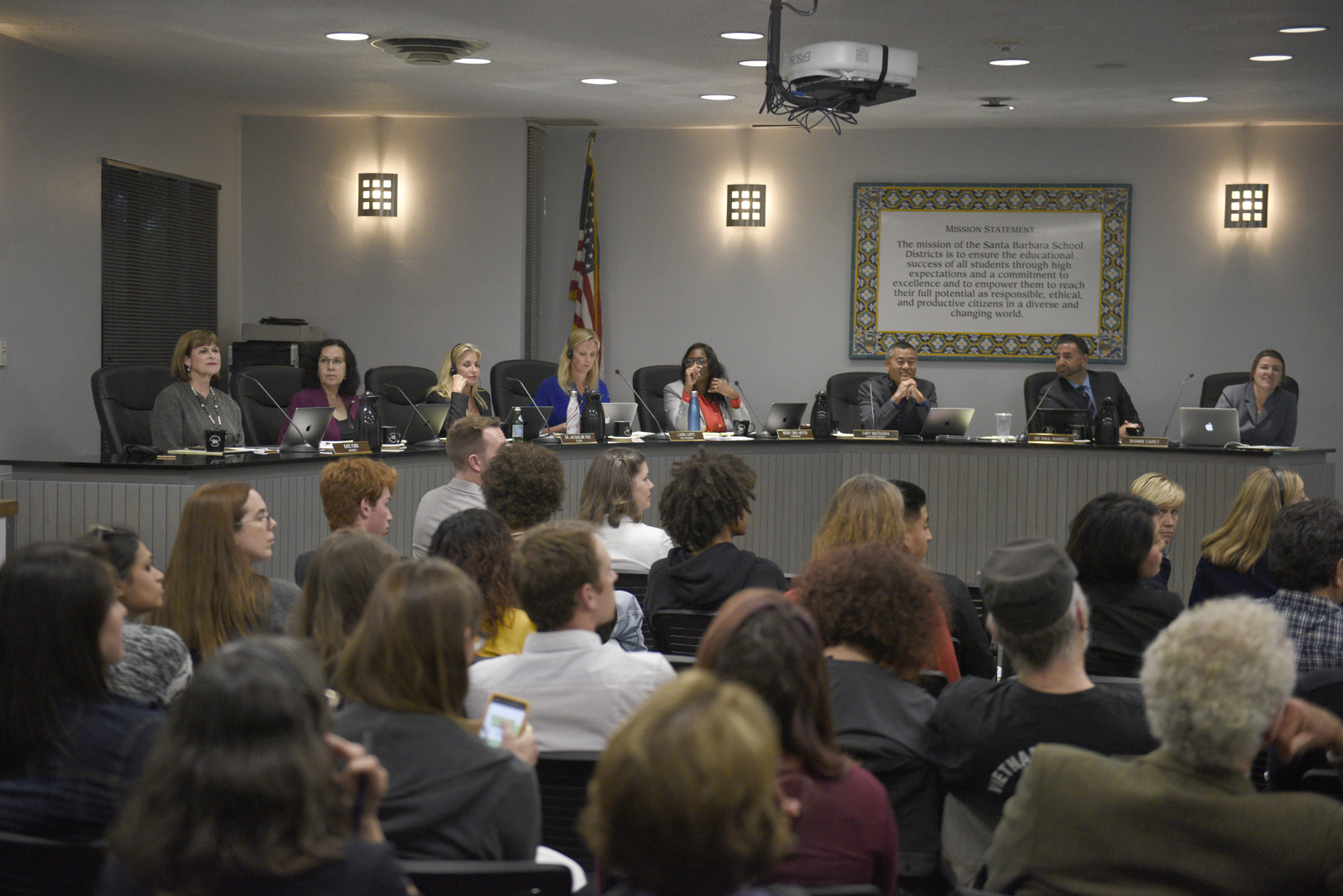Fair Education vs. Just Communities Boils Over at School Board
Racial Sensitivity Training Encounters Discrimination Charges

Members of the watchdog group Fair Education flooded Tuesday’s Santa Barbara Unified school board meeting, occupying more than half the room and accounting for nearly all the public comments. The taxpayer group fiercely opposes implicit-bias education — voluntary classes intended to heighten racial awareness among students — and is pursuing a lawsuit to expose what it calls discrimination against white, Christian, and conservative students.
Just last week, the group filed court declarations outlining specific instances of discrimination at the hands of Just Communities Central Coast, the nonprofit group that offers the implicit-bias trainings. The declarations were required to provide a basis for a lawsuit against Just Communities and the district. The original suit, filed in December, was thrown out on a technicality. Fair Education filed a new suit in April, which the district has since asked the courts to reject.
“My son gave a stirring presentation of what Just Communities has done; we call it ‘unjust communities,’” said Greg Hammel, a member of Fair Education who submitted one of the five declarations last week. “My son got punched because of his skin color. If he were black, you guys would have been running up a pole to CNN.
“When all of that curriculum hits the ground with the kids, it is divisive and causes violence in your schools.” As the school boardmembers sat mute — they cannot respond to public comment per the Brown Act — Hammel kept raising his voice and demanding they show the Just Communities curriculum, repeatedly asking why they wouldn’t respond: “I guess the answer is that it’s so bizarre you can’t show it.”
Perhaps the most disturbing declaration, however, included an email from a mother who claimed her son became suicidal after a Just Communities session called Talking in Class. “Mom, for just a moment I truly felt like killing myself today,” the 14-year-old was quoted in the email. He said he hated being white, and “I can understand why some Latino kids don’t like us.”
That letter was referenced by multiple Fair Education commenters. Jill Rivera, who ran unsuccessfully for a position on the school board last year, admonished the boardmembers for not responding to the depositions.
“You guys have hired nonprofits that aren’t vetted, and our kids are subjected to these classes, and we can’t see the curriculum,” Rivera said. “To see a child talking about killing themselves from an after-school program, that’s pretty serious. One kid is enough; this program is damaging and divisive. Enough.”
In addition to the concerns with Just Communities, some speakers said the district is mistreating its dyslexic students. Monie de Wit, a well-known literacy advocate, said her dyslexic son wasn’t given enough attention in Santa Barbara public schools, so she had to put him in a private school. “Stop wasting money on Just Communities,” de Wit said. “Literacy is a human right, and our dyslexic children deserve the right to a fair and just education.”
Her sentiments were shared by people outside the Fair Education group. It seemed that was the one issue both sides agreed on at the meeting. Cheri Rae, a dyslexia advocate who is not a member of Fair Education, had a similar narrative to de Wit’s. Her son, who is dyslexic, was reading at a 2nd-grade level when he was in 7th grade 10 years ago. She said the district paid for him to receive private remedial services, which it no longer does.
“A week ago I attended an IEP (Individualized Education Program) as a volunteer advocate for a dyslexic 6th grader. He’s been in special education since 2016 and has made no progress … this is a bright child who is a struggling reader,” Rae said. “Students come into this district with learning disabilities and leave with emotional disturbances.”
The hearing for the Fair Education lawsuit against the district, Just Communities, and Superintendent Cary Matsuoka is set for September 17.
“Just Communities denies the allegations in the lawsuit and will vigorously defend itself against these claims,” said Executive Director Jarrod Schwartz in an outside interview. “… We stand by our belief that our work does not discriminate against any group of people.”



